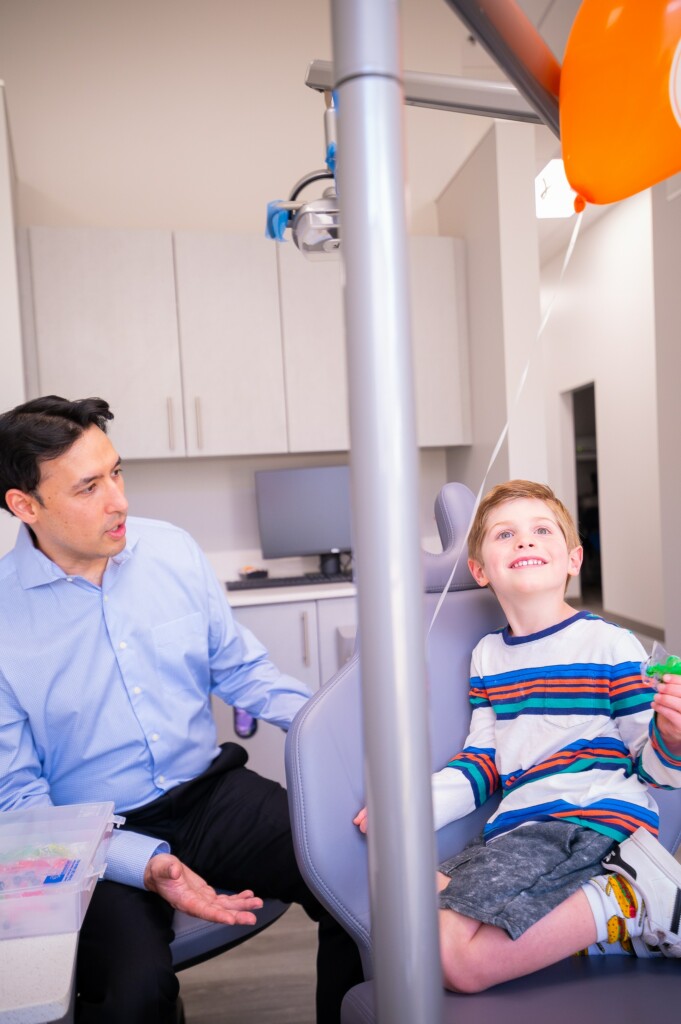Great oral hygiene habits can keep your teeth healthy and strong for a lifetime. The sooner you start brushing and flossing well, the more likely you are to continue these habits for life.
At Woodhill Dental Specialties, we teach good brushing and flossing habits to patients of all ages. Seeing the dentist two times a year is important for teeth care. It's also crucial to know how to stop tooth decay at home. Here are some suggestions to teach your children how to keep their teeth healthy and strong with good oral hygiene.
Manual toothbrushes are OK, but for children, an electric toothbrush has a lot of advantages. Dr. Tujios of Woodhill Dental Specialties recommends electric toothbrushes for younger children to help them clean their teeth better.
“Children don’t have the same manual dexterity as adults, so helping them with oral hygiene any way we can is a must,” he explained. He recommends finding a good electric toothbrush with swappable heads. The head should be changed every couple of months when the bristles fray. That’s because frayed bristles don’t clean as well.
Electric toothbrushes are also great for older children, but they can use a manual toothbrush. They have the ability to maneuver the toothbrush better, so they can get their teeth cleaner with a manual toothbrush.
Whichever toothbrush you choose, Dr. Tujios recommends you buy a toothbrush with soft bristles. Those with medium or hard bristles can be too harsh on your gums, and your gums could recede over time. So stick with soft bristles, and don’t forget to brush your tongue!

What toothpaste is best? You may think fluoride toothpaste is the best option, but it’s not good for the smallest dental patients.
You should start cleaning your child’s teeth as soon as they erupt, but use a washcloth with warm water. This will clean the teeth and let your child get used to having something in their mouth cleaning their teeth.
After a few teeth are in, switch to a small toothbrush for young children (1-3 years) and use non-fluoride toothpaste. Dr. Tujios recommends a Xylitol-based toothpaste that will eliminate the bad bacteria and promote the growth of good bacteria, which will help your child digest their food and keep their teeth clean.
After age 3, you can start your child on a fluoride toothpaste. Add a pea-sized amount to a toothbrush, but make sure they spit any excess out after brushing. If they haven’t gotten a handle on spitting yet, stick with the non-fluoride toothpaste until about age 5. After that, fluoride toothpaste should work just fine.
Many people use water flossers, such as those from Waterpik, to floss their teeth. While water flossers are a good addition, they’re no substitute for the scrubbing power of good, old-fashioned dental floss.
Regular dental floss allows you to scrub between your teeth, removing plaque and food particles. Floss before you brush so that you can brush away what you pull from between your teeth.
If your child isn’t big on plain floss, try flavored flosses, like cinnamon or mint. Dr. Tujios also recommends using dental floss picks, which are plastic picks that have a small piece of dental floss between two prongs. They tend to be a bit easier to maneuver for kids.
Once you’ve used dental floss, you can use a water flosser later for added cleaning between regular flossing.
Your child needs to rinse and spit easily to use mouthwash. That means you probably want to wait until the child is about 5 years old. A fluoride rinse is a great way for children to strengthen their enamel.
The child should use the mouthwash after brushing and flossing and shouldn’t rinse, eat, or drink afterward. This gives the fluoride time to react chemically with saliva and soak into the enamel. Dr. Tujios recommends having your child use the fluoride rinse before bed so they won’t eat or drink afterward.
Dr. Tujios recommends not letting small children use mouthwash for bad breath. Some such mouthwashes contain alcohol, which isn’t good for children.
“Just drink plenty of water, brush and floss well, and there shouldn’t be any bad breath,” Dr. Tujios said. “If bad breath persists, please see your dentist for further recommendations.”
It’s not always easy to motivate young children to brush and floss. Dr. Tujios has some great ideas to help your child enjoy their time brushing using a few extra accessories.
Grab a timer to help your child learn how long they should brush. You need to brush for at least two minutes each time, taking care to hit every surface of every tooth. A digital time can help the child learn how long to brush, or you can grab an old-fashioned hourglass timer.
Another way to teach your child timing is with a video or two. Find fun videos on YouTube that last for two minutes. Several videos on YouTube provide fun songs and visuals to encourage your child to brush their teeth for two minutes. Search for “Tooth brushing timer” or “teeth brushing song” for great options.
The sooner your child learns great brushing and flossing habits, the better the chances they’ll keep that oral hygiene routine going through adulthood. Besides home habits, your child must see a dentist at least twice a year for a thorough examination and professional cleaning.
Woodhill Dental Specialties offers dental cleanings in Dallas, TX, and Rockwall, TX, for young patients. We’ve provided pediatric dentistry and orthodontics to the Dallas Metroplex since 1949 and are eager to help your family. Start a virtual consult to find out more about Woodhill Dental Specialties.